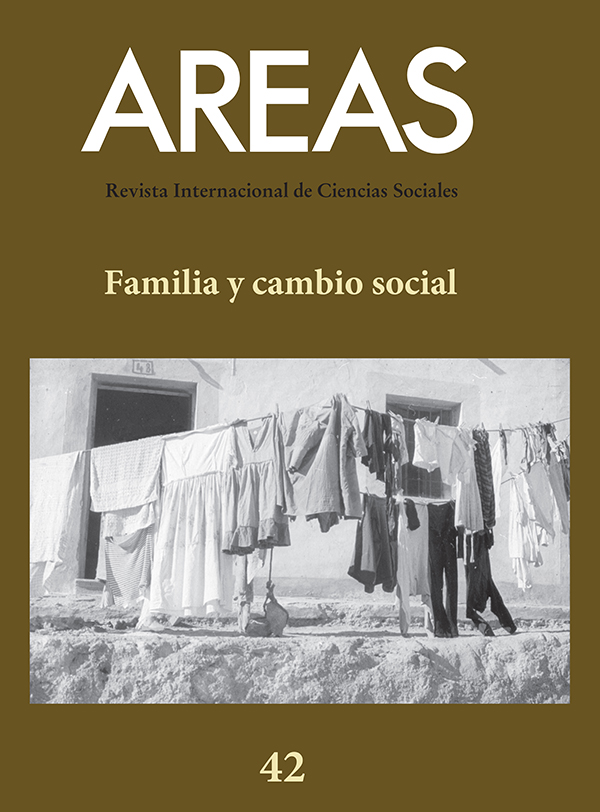ALTERED CHILDHOOD IN CHILD CUSTODY LAWSUITS
Abstract
In this article, the disputes of mothers and fathers about the custody and visitation of their sons and daughters are analyzed, through an interpretation of their narratives. It focuses on cases where divorce is conflictive, evidencing a significant presence of forms of gender-based violence, with and without a judicial complaint. Through stories, I analyzed the previous situation, the judicial process and the relations between the ex-partner once the definitive judicial measures had been taken in relation to the children. Nodal but not very visible elements are identified and analyzed at each moment of the judicial process: in the initial situation, the uncertainty experienced by the absence of rules of coexistence. Then, the difficulties posed by judicial rituals in showing complex situations and the mothers’ dilemma about whether or not to report the inconvenience their children may suffer for fear that they will not be believed. Finally, the emergence of new types of covert violence, such as financial abuse related to pensions and custody harassment. Divorces in which conflict becomes chronic can disrupt children’s daily lives.
Downloads
-
Abstract1522
-
PDF (Español (España))1040
-
HTML (Español (España))549
References
ALONSO, L. E. (2013): “La sociohermenéutica como programa de investigación en sociología”, Arbor, 189 (761), a035. doi: http://dx.doi.org/10.3989/arbor.2013.761n3003
ARCE, Ramón; FARIÑA, Francisca y SEIJO, Dolores (2013): “¿Disimulan los progenitores en litigio por la custodia en el 16 PF-5?”, Anuario de Psicología Jurídica, 23, pp. 25-30.
BOYD, Susan B. (2010): “Autonomy for Mothers? Relational Theory and Parenting Apart”, Feminist Legal Studies, 18, pp. 137-158
COHEN, Orna y SEGAL-ENGELCHIN, Dorit (2000): “Suzi and Mr. S.: Gender Role Stereotyping in Social Workers. Court Reports in Custody and Access Cases”, Smith College Studies in Social Work, 70, pp. 475-500.
DÍAZ MARTÍNEZ, Capitolina (2015): “La perspectiva de género en investigación social”, en Manuel García Ferrando et al. (eds.), El análisis de la realidad social: métodos y técnicas de investigación. Madrid, Alianza, pp. 176-201.
EICHLER, Margrit (1991): Nonsexist research methods: A practical guide. London, Routledge.
ELIZABETH, Vivienne (2017): “Custody Stalking: A Mechanism of Coercively Controlling Mothers Following Separation”, Feminist Legal Studies, 25, pp. 185-201. Doi: https://doi.org/10.1007/s10691-017-9349-9
ELIZABETH, Vivienne; GAVEY, Nicola y TOLMIE, Julia (2010): “Between a rock and a hard place: Resident mothers and the moral dilemmas they face during custody disputes”, Feminist Legal Studies, 18 (3), pp. 253-274.
FASCIOLI, Ana (2010): “Ética del cuidado y ética de la justicia en la teoría moral de Carol Gilligan”, Revista Actio, 12, pp. 41-57.
FINEMAN, A. Martha (1988): “Dominant Discourse, Professional Language, and Legal Change in Child Custody Decision-making”, Harvard Law Review, 101, pp. 727-774.
GILLIGAN, Carol (1985): La moral y la teoría. Psicología del desarrollo femenino. México, FCE.
GILMORE, Stephen (2006): “Contact/shared residence and child well-being: research evidence and its implications for legal decision-making”, International Journal of Law, Policy and the Family, 20 (3), pp. 344-365. Doi: https://doi.org/10.1093/lawfam/ebl016.
GLASER, Barney G. y STRAUSS, Anselm (1967): The Discovery of Grounded Theory. Strategies for Qualitative Research. Chicago, Aldine.
HACKER, Daphna (2008): “A legal field in action: the case of divorce arrangements in Israel”, International Journal of Law in Context, 4 (1), pp. 1-33. Doi: https://doi.org/10.1017/S1744552308001018.
HARRISON, Christine (2008): “Implacably hostile or appropriately protective? Women managing child contact in the context of domestic violence”, Violence Against Women, 14, pp. 381-405.
HUNTER, Rosemary (2015): “More than just a different face? Judicial diversity and decision-making”, Current legal problems, 68 (1), pp. 119-141. Doi: https://doi.org/10.1093/clp/cuv001.
JABBAZ CHURBA, Marcela y Capitolina Díaz Martínez (coords.) (2020): Menores en disputa: custodia, visitas y patria potestad en la Comunidad Valenciana. Valencia, Tirant lo Blanch.
JEFFRIES, Samantha (2016): “In the Best Interests of the Abuser: Coercive Control, Child Custody Proceedings and the “Expert” Assessments That Guide Judicial Determinations”, Laws, 5 (1), 14. Doi: https://doi.org/10.3390/laws5010014.
JICK, Tobd (1979): “Mixing Qualitative and Quantitative Methods: Triangulation in Action, Administrative Science Quartely, 24 (4), pp. 602-611. Doi: https://doi.org/10.2307/2392366.
MCINTOSH, Jennifer; TAN, Evelyn; LEVENDOSKY, Alytia y HOLTZWORTH-MUNROE, Amy (2019): “Mothers’ experience of intimate partner violence and subsequent offspring attachment security ages 1–5 years: A meta-analysis”, Trauma, Violence, & Abuse, 21, pp. 1-15. Doi: https://doi.org/10.1177/1524838019888560.
MINISTERIO DE IGUALDAD (2019): Macroencuesta de violencia contra la mujer. https://violenciagenero.igualdad.gob.es/violenciaEnCifras/macroencuesta2015/pdf/Macroencuesta_2019_estudio_investigacion.pdf.
MORGAN, Gareth (1983): Beyond method: Strategies for social research. Los Ángeles, Sage.
NATALIER, Kristin (2018): “State Facilitated Economic Abuse: A Structural Analysis of Men Deliberately Withholding Child Support”, Feminist Legal Studies, 26, pp. 121-140. Doi: https://doi.org/10.1007/s10691-018-9376-1.
RODRÍGUEZ-LLAMAS, Sonia (2020): “Lo que dice el poder judicial sobre la guarda y custodia”, en Marcela Jabbaz Churba y Capitolina Díaz Martínez (coords.), Menores en disputa: custodia, visitas y patria potestad en la Comunidad Valenciana. Valencia, Tirant lo Blanch, pp. 199-223.
WATSON, Laurel B. y Ancis, Julie R. (2013): “Power and Control in the Legal System: From Marriage/Relationship to Divorce and Custody”, Violence Against Women, 19 (2), pp. 166 -186. Doi: https://doi.org/10.1177/1077801213478027.
ZELIZER, Viviana (2011): El significado social del dinero. Buenos Aires, Fondo de Cultura Económica.
The published works by this Journal are subject to the following terms:
1. The Publication Service of the University of Murcia (the Editor) owns the copyright of its publications. It promotes and allows its use under the indicated licence in Section 2.
© Servicio de Publicaciones, Universidad de Murcia, 2011
2. Papers are digitally published under the licence Creative Commons Reconocimiento-NoComercial-SinObraDerivada 3.0 España (legal text). They can be copied, used, disseminated, transferred and publically presented if: i) the author is quoted, as well as the original source of publication (Journal, editorial and URL); ii) they are not used for commercial purposes; iii) the licence of use is mentioned.
3. Auto-file Conditions. It is allowed and authors are encouraged to digitally disseminate their pre-print versions (versions prior to review) and/or post-print (reviewed version accepted for its publication) since it promotes its early diffusion and the corresponding increase of quotes and scope within the academic community. RoMEO Colour: green.


